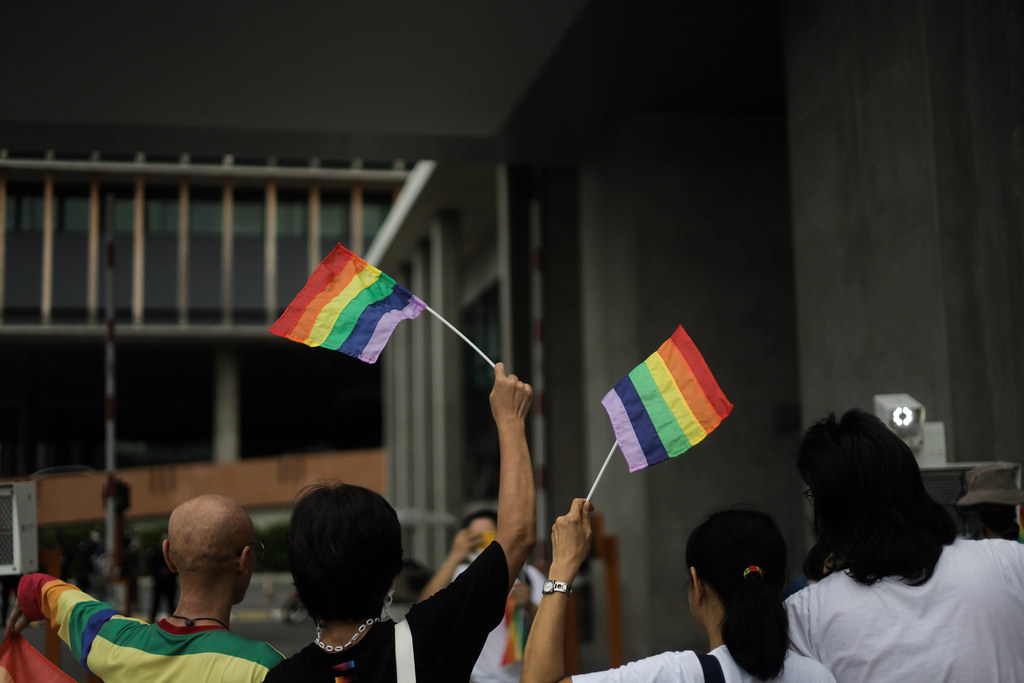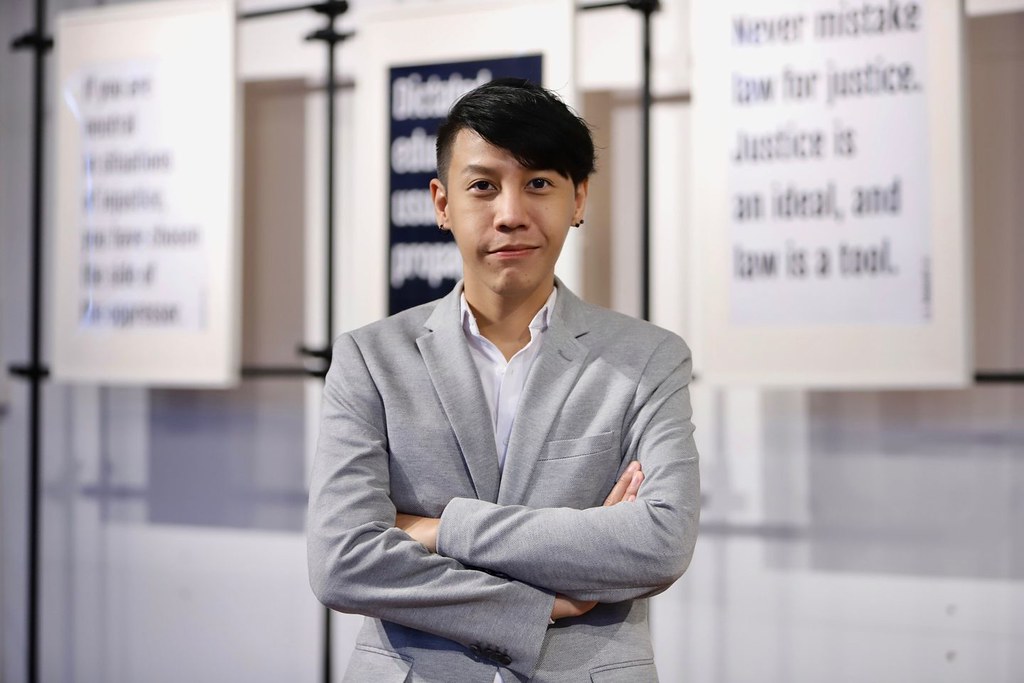The Drafting Committee for the Civil Partnership bill and the Marriage Equality bill has said that it will push for both bills to go before parliament before the end of the current session, while concerns have been raised about homophobia among committee members.

Activists gathering at the Kiakkai parliament complex wave Pride flags after the Marriage Equality bill passed its first reading on 15 June.
The Secretariat of the House of Representatives reported last Wednesday (31 August) that the Drafting Committee held a press conference announcing that it has almost done drafting the Civil Partnership bill and only has 4 sections left to discuss, and that it intends to push for both the Civil Partnership bill and the Marriage Equality bill to go before parliament for their second reading before the end of the current session on 18 September.
The Marriage Equality bill and the Civil Partnership bill both passed in their first reading on 15 June. After the committee has finished discussing them, they will be returned to parliament for their second and third readings. If they are approved by parliament, they will then be passed to the Senate for another three readings before the King signs them into law.
Committee spokesperson Chanan Yodhong said that although the two bills are similar in that they are both to do with the rights of LGBTQ people, they are different at their core. The Marriage Equality bill, he said, aims to amend the Civil and Commercial Code to allow anyone to register their marriage regardless of gender, which would give everyone equal right to be legally married. The Civil Partnership bill, meanwhile, is a separate item of legislation first drafted in 2013, when several countries were issuing Civil Partnership laws to legalise same-sex marriage. Chanan noted that the term ‘civil partner’ is new to Thai law, and must be added to other legislation, and that the rights and benefits given to civil partners are still lacking, and the Committee has tried to amend it to be up to date with the current situation.
The Marriage Equality bill was proposed by MPs from the Move Forward Party (MFP) and proposes that the terminology used in the current marriage law be changed to use “spouse” instead of “husband” and “wife” and “person” instead of “man” and “woman.” If passed, the proposed amendments would allow individuals to be legally married regardless of gender, and ensure that they receive equal rights, duties, and protection under the law.
The Civil Partnership bill, meanwhile, sets out a civil partnership as a union between two people of the same gender, both of whom must be at least 17 years old and at least one of whom must be a Thai national. It has also been previously criticised by civil society for being unclear about whether certain rights are granted, and whether people would be denied their rights if they have to depend on an official’s discretion on whether certain laws apply to them. Concerns have also been raised that separate legislation for LGBTQ marriage would worsen the stigma against the LGBTQ community in Thailand, and that if the Civil Partnership bill passes, it will be more difficult to campaign for further amendments to the Civil and Commercial Code as it could be argued that LGBTQ marriage is already legalized.
Chanan noted that the committee has amended the Civil Partnership bill to allow a man and a woman to also register as civil partners, which he sees as given more choices to heterosexual couples, who would be able to choose whether to register as spouses or as civil partners, while LGBTQ couples may only register as civil partners. He said that this has led to a discussion of whether to give civil partners fewer rights than spouses, and if the bill passes, it would mean that LGBTQ couples do not have equal rights with heterosexual couples.

Chanan Yodhong
Chanan also raised concerns that some committee members have shown homophobic attitudes, as well as a lack of understanding about LGBTQ rights. He said that some members have said that the law should not be amended for a minority, and that amending the original marriage law would destroy Thai culture as only men and women should be able to get married. Some members also believe that LGBTQ couples should use the Civil Partnership law because same-sex love is unnatural, and that replacing the term “husband” and “wife” with “spouse” is a violation of the rights of heterosexual people.
Another concern Chanan raised is that one committee member has shown strong opposition to the Marriage Equality bill and expressed the intention to get the bill thrown out of parliament. Chanan said that the member has reserved their opinion on every section of the bill in order to be able to oppose it during the parliamentary debate so that the bill is rejected.
Chanan called on the public to pay attention to the process of passing the two bills, both at the committee and the parliamentary level, and to respect other people’s dignity as humans. He said that people can live together and follow the law regardless of their gender identity, and that anyone who tries to oppose marriage equality is opposing human rights and equality, as well as trying to preserve discrimination, ignoring the people’s humanity.

MFP MP Tunyawaj Kamolwongwat and other MPs celebrated with LGBTQ rights activists gathering at the Kiakkai parliament complex when the Marriage Equality bill passed its first reading on 15 June.
On Thursday (1 September), Chanan and MFP MP Tunyawat Kamolwongwat participated in a live interview on Twitter Space, a summary of which has been published by Voice Online. Tunyawat also raised concerns about homophobic attitude among committee members, and the efforts of a committee member to get the bill rejected.
Tunyawat said that if the Marriage Equality bill passed, the earliest it would come into effect would be in mid-2023, noting that a general election might take place in early 2023. If parliament is dissolved but the bill has already passed at the parliamentary level, it would be passed to the Senate, which would have one more year left of their term. If this does not happen, then the next government could return the law for consideration, but it would be delayed if the next government does not think it is important.
“If [the Marriage Equality bill] is rejected, then I have to say that those in power are really blind. You have no vision, and you do not see the people as supreme,” Tunyawat said.
Chanan also said during the interview that he has heard of the demand for committee advisors who are not LGBTQ so that the law would be neutral, which for him reflects how some people do not see the LGBTQ community as part of society and do not believe that gender and sexuality is fluid.
“The way they say we should pick committee advisors who are neutral sounds like heterosexual people and LGBT people are enemies to the point that we have to find a compromise, which is a cause for concern, but the committee meetings are like a large family, so we have to find a common agreement,” Chanan said.
Both Chanan and Tunyawat said that the use of language in Thai law is problematic to begin with, as most legislation is still based on the gender binary. Chanan gave the example of the term ‘intercourse,’ which is defined as sexual relations between a man and a woman, and so if the term is used in legislation, it might not apply to LGBTQ people. He said that, as the world changes, one should be more sensitive about language-use when drafting a bill.
Tunyawat said that, when he proposed the use of the term ‘infidelity,’ some members still see it as between a man and a woman. He noted that, even though the Civil and Commercial Code is old law, laws should be capable of amendment and language should not take precedence over humanity. He said that the use of the term ‘spouse’ does not mean the terms ‘husband’ and ‘wife’ would no longer exist, but the language would instead cover everyone, and that the accusation that the intention is to destroy tradition reflects those committee members’ own homophobia.
Meanwhile, gender equality activist Chumaporn Taengkliang said that this Thursday (8 September), representatives of civil organizations will be filing an open letter with the drafting committee calling for the Marriage Equality bill to pass during its second and third reading and go to the Senate. She also said that if the government or the Senate reject the Marriage Equality bill, civil society is ready to propose their own version of the bill, and that she believes the people want marriage equality and are ready to keep an eye on how each party votes, so MPs should listen to what the people want.
Prachatai English is an independent, non-profit news outlet committed to covering underreported issues in Thailand, especially about democratization and human rights, despite pressure from the authorities. Your support will ensure that we stay a professional media source and be able to meet the challenges and deliver in-depth reporting.
• Simple steps to support Prachatai English
1. Bank transfer to account “โครงการหนังสือพิมพ์อินเทอร์เน็ต ประชาไท” or “Prachatai Online Newspaper” 091-0-21689-4, Krungthai Bank
2. Or, Transfer money via Paypal, to e-mail address: [email protected], please leave a comment on the transaction as “For Prachatai English”
